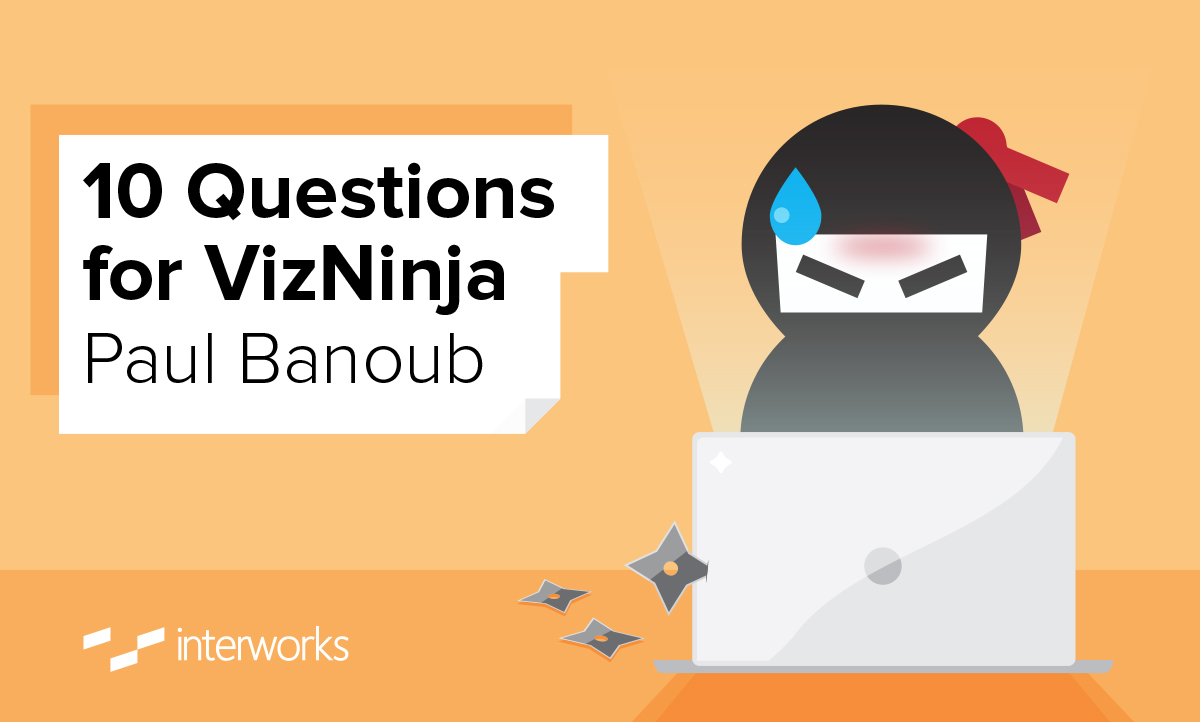10 Questions is an ongoing blog series in which Tableau Zen Master Dan Murray interviews some of the brightest folks in the world of data.

I became aware of Paul Banoub a couple of years ago via Twitter and then his blog. Paul started doing interviews of Tableau community members a while ago. I didn’t realize that until I started digging into his website for this post. Paul is generous, enthusiastic and a great example of why the Tableau community is so fun.
The Questions
Q: Where do you work and what is your role?
Banoub: I run a Tableau Centre of Excellence at UBS. We provide a global Tableau Server service to the whole bank across IT and the Business. That involves a robust production installation of Tableau Server but also assisting users with data visualization best practices, training and Tableau Doctor sessions, conference presentations and the evolution of a passionate community of users as well as alpha/beta testing and relationships with consultancies like InterWorks, The Information Lab and Slalom. It’s an incredibly varied role and hard work, but we get to cover all aspects of Tableau, so it’s always interesting.
One of the great aspects of providing a Tableau service to such a massive organisation is that we can help so many different business units because everyone has data. Teams in HR, IT and Project Management can get as much value from Tableau as Finance and the Business.
Q: When and how did you first discover Tableau?
Banoub: That was about three years ago when I was managing another infrastructure service at Royal Bank of Canada. Usual story, battling with Excel reports and sick of wasting time, one of the other managers said, “I’ve got something to show you.”
Of course, I was too busy and kept cancelling his meetings until I eventually made the best decision of my career and let him show me Tableau. I wasn’t immediately aware of how good it was, but pretty soon it started allowing me to make tangible differences to the operation of my and several other teams, and then I knew I was onto something.
I was initially pretty cynical as it is, after all, only a piece of software, but the strong community and dynamic company behind it combine to make Tableau a highly compelling solution.
Q: How do you use Tableau in your job?
Banoub: My team needs to know the tool from top to bottom. We get deep and dirty with Tableau Server and help users create ace content in Tableau Desktop. It’s up to me to ensure that we cover all aspects of Tableau as a team, even if no one person knows everything. I try and maintain a decent general understanding of the tool, and I’m very interested in how Tableau Server works. My background in enterprise infrastructure helps a lot as problems can occur with any component of the service. Of course, I still need to keep skills fresh in desktop, so I try and do as much Tableau Public stuff as I can.
The best aspect of our setup is that I have control of every single aspect of Tableau in my company. From the server architecture and configuration, deployment of the tool, best practices, training and community, right up to the way the service gets marketed – it’s our decision. There’s no IT vs. the Business split – every decision is down to us. I know how lucky I am to be in that position as it’s not always the case in some organisations.
Q: You’ve been a pretty prolific blogger. What is your motivation for VizNinja?
Banoub: My main goal for 2014 was to blast myself out of my comfort zone. I’ve never been confident enough to blog, but I thought it would be a great way of testing myself to see if my knowledge could be of use to people. So, setting up the blog was part of that.
It’s been a great first year for the blog. Loads of feedback, comments and a decent hit count. But the best moments are the unexpected ones. I’ve had reports from some consultant friends who arrive on a site and the client pulls out a printed copy of my blog and says, “I want to do THIS!” Things like that are a real boost for the spirits and just make me want to post more content.
I think it’s important to be yourself with blogging. There’s no point competing with people as there are so many talented people out there with awesome blogs. So, be yourself and develop your own style. Most of all, do it for yourself and don’t feel under pressure.
Actually, this interview reminds me; there’s already a short interview series out there. Guess I should have copyrighted the idea!
Q: Are you involved in a user group?
Banoub: Yes, for the last couple of years, I’ve been the Co-Chair of the London TUG along with Paul Chapman of Easyjet and Thasan Vallipuranathan. I also run a couple of internal user groups. I’m always amazed at the user appetite for user groups and their willingness to spend personal time talking Tableau. I’ve also been grateful to you, Andy Kriebel, Ryan Sleeper, KK Molugu and others who have been involved in very successful TUGs and provided some great advice.
Q: What do you have to say about Tableau’s Conferences? In Europe? In the USA?
Banoub: I presented at both the London and Seattle conferences in 2014, and it was the best experience of my career. To be on stage in front of 500 people and feel comfortable, and that the audience are on your side, is typical of the vibe you get at these events. They’re nothing like any other vendor event I’ve ever been to. Conferences can be tricky to get signed off as many are a waste of time, but the Tableau events are better than any training course you’ll ever go on.
I did one presentation called “Making a Viz that Stops Traffic” with Dan Montgomery, Jewel Loree and Anya A’Hearn that was so much fun it was crazy. Even better, it inspired loads of new people to start blogging and join the community – that was ace.
Honestly, I was blown away by the Seattle event. It was phenomenal.
Q: What features and capabilities would you like to see Tableau add to its product line over the next several years?
Banoub: For me, it’s all about the enterprise capabilities. Version control, alerting, environment management and richer metadata of content would all make a huge difference to my users. But also, I’m interested to see what doesn’t get added. That might seem strange, but I’d be gutted to see 3D, speedometers, gauges and other chart junk appear. I want Tableau to stick to their principles and best practices for great visual analytics rather than caving into commercial pressure and letting the tool become like any other.
Q: Do you have an internal user group at UBS? If so, how are you organized? What are your goals for the group?
Banoub: Yes, we have several. One in APAC, one in EMEA and one in the USA. Users are also spinning off their own user groups that are more focused to individual business units. I’m always amazed at how using Tableau seems to make people want to get together and collaborate. The only real goal for the events is to keep them fun and enjoyable.
Q: If Tableau V9.0 was available in 2007, do you think we could have avoided the global financial meltdown?
Banoub: No, but we could have at least had some decent visualisations of the mess rather than the hopeless efforts regularly produced by mainstream media and news channels. Really, they should run everything by Alberto Cairo, Andy Kirk and Robert Kosara before publishing.
Q: Who inspires you?
Banoub: I’m really inspired by the #womenindata that we see doing great things in the Tableau and data viz world. I’ve been in IT for 15 years, and it’s been a totally male-dominated experience until, that is, I got into Tableau.
Then, I was blown away by the amazing work of Kelly Martin, Anya A’Hearn, Jewel Loree, Emily Kund, Donna Coles, Jen Vaughan, Sarah Nell, Fiona Gordon, Emma Hicks, Jen Underwood, Cole Nussbaumer, Jen Stirrup, Emma Whyte and loads more.
Their contributions give the Tableau community another dimension.
Discover More Interviews
Want to read more insightful interviews like this one? Then you’ll love our 10 Questions blog series. Check out the full list of interviews here, and stay tuned for new additions.
Need Help? Let Us Know!
There you have it. If you need help with your data infrastructure or Tableau, we have the experience, skill, and knowledge to insure your success. Contact us today to learn more.
If you’re in college and think you might want to get into this game, head to our Careers page and apply for one of our open jobs. We’d love to hear from you.

